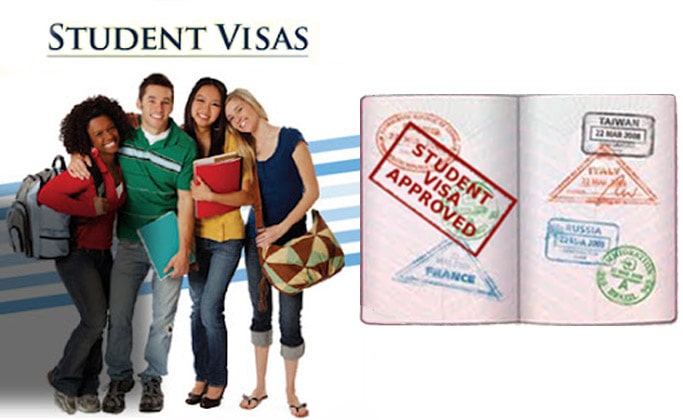
Table of Contents
-
Introduction
-
Understanding Student Visas
-
Why Part-Time Work Rights Matter for International Students
-
Countries That Offer Student Visas with Part-Time Work Rights
-
United States
-
United Kingdom
-
Canada
-
Australia
-
Germany
-
New Zealand
-
Ireland
-
France
-
Netherlands
-
Japan
-
-
Eligibility Criteria for Student Visas with Work Rights
-
How to Apply for a Student Visa with Part-Time Work Permission
-
Common Jobs Available for International Students
-
How Many Hours Can You Work as a Student?
-
Benefits of Working Part-Time While Studying Abroad
-
Balancing Work and Study: Time Management Tips
-
Legal Restrictions and Tax Rules for Student Workers
-
Questions and Answers (FAQs)
-
Common Mistakes to Avoid When Working on a Student Visa
-
How to Find Part-Time Jobs Abroad as a Student
-
Tips for Succeeding as a Working Student
-
Final Thoughts
1. Introduction
Student Visa with Part-Time Work Rights. Studying abroad is a life-changing experience. For many international students, it represents an opportunity to gain a world-class education, build global networks, and prepare for an international career. However, studying overseas can be expensive. Tuition fees, rent, books, transportation, and daily expenses can add up quickly and make you easily weak.
That’s where a student visa with part-time work rights</strong> comes in. These visas not only allow you to study but also to work legally while studying, helping you support yourself financially and gain valuable work experience that will help you build your future.
In this comprehensive guide about Student Visa with Part-Time Work Rights, we will cover everything you need to know about student visas that allow part-time work. This includes the top countries that offer such programs, their eligibility requirements, the allowed working hours, and tips for balancing work with academics.
2. Understanding Student Visas
A student visa is an official document issued by a country’s immigration authority that allows foreign nationals to study at an accredited institution within its borders. However, not all student visas include work rights. Some countries permit students to work part-time, while others have restrictions on employment unless specific conditions are met.
3. Why Part-Time Work Rights Matter for International Students
For many students, the ability to work while studying is more than a luxury — it’s a necessity. Here’s why part-time work rights are essential:
-
Financial Support: Working part-time helps you cover living expenses and reduce dependency on family or loans.
-
Real-World Experience: It gives you practical experience, helping you develop employability skills.
-
Networking: Working connects you with local professionals and communities.
-
Cultural Integration: You learn the local language and culture faster through daily interaction.
-
Resume Building: Employers appreciate candidates with international work experience.
A study visa that combines education and employment rights helps students thrive both academically and professionally.
4. Countries That Offer Student Visas with Part-Time Work Rights
Many popular study destinations allow international students to work while studying. Below are the leading countries and their specific work-rights policies.
A. United States
-
Visa Type: F-1 Visa
-
Work Rights:
-
On-campus jobs are allowed for up to 20 hours per week during academic sessions.
-
During breaks, students may work full-time on campus.
-
After the first academic year, students can apply for Curricular Practical Training (CPT) or Optional Practical Training (OPT) to work off-campus.
-
-
Example Jobs: Library assistant, cafeteria staff, research assistant.
Note: Unauthorized off-campus work is strictly prohibited and can lead to visa termination.
B. United Kingdom
-
Visa Type: Student Route (formerly Tier 4)
-
Work Rights:
-
Students can work up to 20 hours per week during term time.
-
During vacations, full-time work is permitted.
-
-
Restrictions:
-
You cannot be self-employed or work as a professional athlete or entertainer.
-
-
Popular Jobs: Retail assistant, barista, university ambassador.
C. Canada
-
Visa Type: Study Permit
-
Work Rights:
-
You can work up to 20 hours per week during regular school sessions and full-time during breaks.
-
As of recent updates, Canada has temporarily allowed full-time work during the term for eligible students, depending on policy timelines.
-
-
Post-Graduation Work: You may qualify for the Post-Graduation Work Permit (PGWP) after completing your studies.
D. Australia
-
Visa Type: Subclass 500
-
Work Rights:
-
Students can work up to 48 hours per fortnight during study sessions.
-
Full-time work is allowed during breaks.
-
-
Industries Hiring Students: Retail, hospitality, administration, and customer service.
-
Post-study Options: The Temporary Graduate Visa (Subclass 485) allows you to stay and work after graduation.
E. Germany
-
Visa Type: Student Visa or Residence Permit for Study
-
Work Rights:
-
International students may work 120 full days or 240 half-days per year.
-
No work permission is required for these limits.
-
-
Typical Jobs: Tutors, waiters, delivery drivers, or research assistants.
Germany’s low tuition fees and student-friendly policies make it one of the most attractive study destinations in Europe.
F. New Zealand
-
Visa Type: Fee-Paying Student Visa
-
Work Rights:
-
Up to 20 hours per week during term.
-
Full-time during scheduled holidays.
-
-
Additional Option: Master’s and PhD students can work full-time year-round.
G. Ireland
-
Visa Type: Stamp 2 Student Visa
-
Work Rights:
-
Work 20 hours per week during academic sessions.
-
40 hours per week during holidays.
-
-
Special Benefit: Graduates can stay up to 12–24 months to find employment through the Third Level Graduate Scheme.
H. France
-
Visa Type: Long Stay Student Visa (VLS-TS)
-
Work Rights:
-
Work up to 964 hours per year (roughly 20 hours per week).
-
No need for a separate work permit.
-
France’s flexible rules and rich culture make it a popular option for students seeking both education and income opportunities.
I. Netherlands
-
Visa Type: Dutch Student Visa / Residence Permit
-
Work Rights:
-
Students from non-EU/EEA countries can work 16 hours per week during term and full-time during June–August.
-
Employers must apply for a work permit (TWV) for you.
-
J. Japan
-
Visa Type: Student Visa with “Permission to Engage in Activity Other Than That Permitted”
-
Work Rights:
-
Up to 28 hours per week during term and 40 hours during holidays.
-
Students must obtain permission from the immigration office before starting work.
-
Japan combines academic excellence with opportunities to gain real-world skills, especially in tech and hospitality.
5. Eligibility Criteria for Student Visas with Work Rights
While requirements differ by country, most nations require:
-
Proof of Admission – Acceptance letter from a recognized institution.
-
Financial Proof – Evidence that you can support yourself during your stay.
-
Health Insurance – Valid medical coverage for your study period.
-
Language Proficiency – Proof of English or local language proficiency (IELTS, TOEFL, etc.).
-
Clean Background Record – No criminal record.
-
Full-Time Enrollment – You must remain enrolled in a recognized full-time program.
6. How to Apply for a Student Visa with Part-Time Work Permission
Here’s a step-by-step approach that applies to most countries:
-
Secure Admission to a recognized institution abroad.
-
Pay the Tuition Deposit and obtain an official acceptance letter.
-
Gather Required Documents, including passport, academic transcripts, and financial proof.
-
Apply for a Student Visa through the relevant consulate or online portal.
-
Attend a Visa Interview (if required).
-
Obtain Work Authorization (some countries grant it automatically, others require separate applications).
-
Travel and register at your local immigration office after arrival.
7. Common Jobs Available for International Students
Depending on your skills, schedule, and location, you can find part-time work such as:
-
Barista or restaurant assistant
-
Sales clerk or cashier
-
Teaching or research assistant
-
Campus library aide
-
Data entry or administrative support
-
Babysitting or tutoring
-
Delivery or logistics assistant
In many cases, universities offer on-campus employment opportunities that fit well with your academic schedule.
8. How Many Hours Can You Work as a Student?
| Country | Hours per Week (Term) | Hours (Breaks) |
|---|---|---|
| USA | 20 | 40 |
| UK | 20 | 40 |
| Canada | 20 | 40 |
| Australia | 24 (fortnightly limit 48) | Full-time |
| Germany | 20 avg (120 full days/year) | Varies |
| Ireland | 20 | 40 |
| France | 20 | 20 |
| Netherlands | 16 | Full-time (summer) |
| Japan | 28 | 40 |
9. Benefits of Working Part-Time While Studying Abroad
-
Financial Relief – Offset high living costs and tuition.
-
Professional Growth – Develop your career skills and enhance your resume.
-
Networking Opportunities – Meet professionals and gain valuable mentorship.
-
Cultural Integration – Develop adaptability and communication skills.
-
Independence – Learn budgeting, time management, and self-reliance.
Working while studying builds both character and competence, helping you prepare for life after graduation.
10. Balancing Work and Study: Time Management Tips
-
Prioritize Academics: Remember that your visa depends on full-time enrollment.
-
Use a Schedule: Plan study, work, and rest times weekly.
-
Choose Flexible Jobs: Campus or weekend jobs often fit best.
-
Avoid Overwork: Fatigue can affect grades and mental health.
-
Set Boundaries: Communicate your study commitments with your employer.
11. Legal Restrictions and Tax Rules for Student Workers
-
Always work within the permitted hours stated on your visa.
-
You may need to apply for a tax identification number or a social security number.
-
In some countries (e.g., Canada, UK), you must pay taxes on your income even as a student.
-
Keep records of your work hours and payments to avoid legal issues.
Failure to comply with work regulations may result in visa revocation.
12. Questions and Answers (FAQs)
Q1: Can I work immediately after arriving as a student?
Yes, in most countries, once your visa and study program are active, you can begin part-time work — though some require additional permits first.
Q2: What happens if I exceed the allowed work hours?
Exceeding your limit can lead to visa cancellation or deportation. Always follow your country’s legal working hours.
Q3: Can my spouse work if I’m on a student visa?
It depends on the country. For example, in Canada and Australia, spouses of full-time postgraduate students often have full-time work rights.
Q4: Can I convert my student visa to a work visa after graduation?
Yes. Many countries offer post-study work options, such as the UK’s Graduate Route, Canada’s PGWP, or Australia’s 485 Visa.
Q5: Is it hard to find part-time work abroad as a student?
It can take effort initially, but universities often have career centers and online portals that list job openings for students.
13. Common Mistakes to Avoid When Working on a Student Visa
-
Working without proper authorization.
-
Neglecting studies due to long work hours.
-
Not reporting income for tax purposes.
-
Failing to renew a visa or work permit on time.
-
Accepting cash-only jobs from unregistered employers.
Avoiding these mistakes will protect your immigration status and ensure a positive study experience.
14. How to Find Part-Time Jobs Abroad as a Student
-
University Career Portals – Most universities advertise campus jobs.
-
Online Job Boards – Sites like Indeed, LinkedIn, and Glassdoor list student positions.
-
Local Businesses – Cafés, stores, and restaurants often hire students.
-
Networking – Connect with classmates or alumni.
-
Recruitment Agencies – Some specialize in student-friendly jobs.
Prepare a short, professional resume tailored to part-time roles.
15. Tips for Succeeding as a Working Student
-
Stay organized with a planner or digital calendar.
-
Build good relationships with your professors and employers.
-
Save a portion of your income for emergencies.
-
Use your job to enhance your language or technical skills.
-
Maintain a healthy balance between study, work, and social life.
Remember, your main goal abroad is education — employment is a supplement, not the focus.
16. Final Thoughts
Before selecting a destination, always research the immigration and labor laws of that country. Adhering to visa regulations and dedicating yourself to your studies will help you make the most of your time abroad studying while working as part term.
Working part-time as a student is not only about earning money; it’s also about laying the groundwork for a successful future.
For more info, visit;
| Country | Official Visa Information |
|---|---|
| United States | US F-1 Visa |
| United Kingdom | UK Student Visa |
| Canada | Canada Study Permit |
| Australia | Australia Student Visa |
| Germany | Germany Student Visa |
Related content: How to get the easiest visa for Nigerian students traveling in 2025





